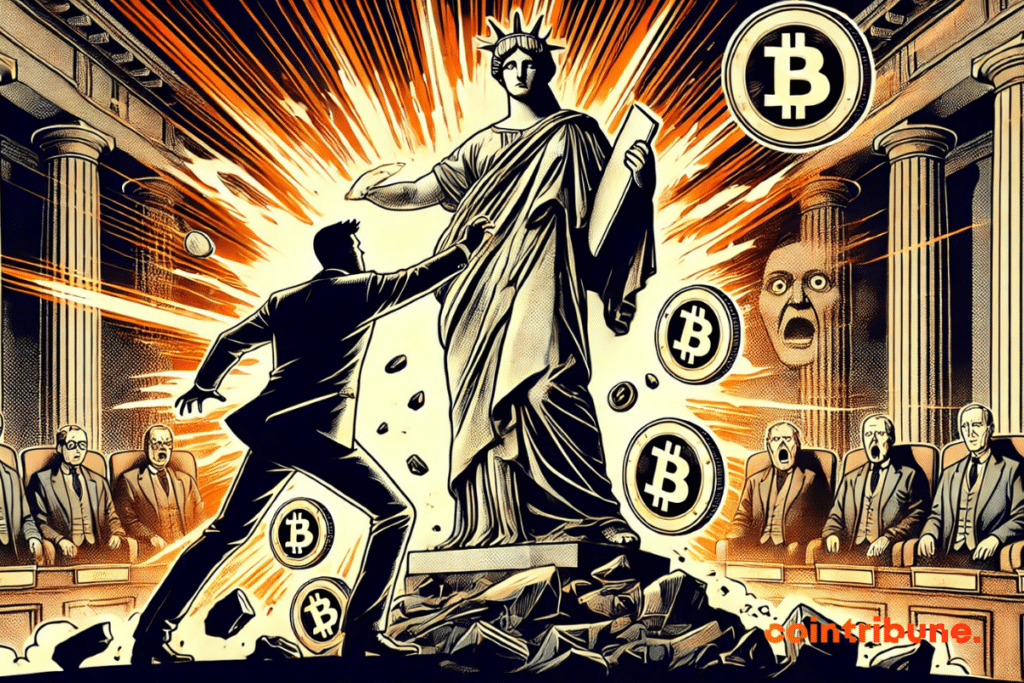Trump Accused Of Plotting To Ditch The Dollar For His Own Cryptocurrency
In a context where crypto infiltrates the arcane realms of power, an accusation shakes Washington. Representative Maxine Waters, a key figure of the Financial Services Committee, accuses Donald Trump of manipulating the legislative chessboard to impose his own crypto interests. Behind the appearances of a technical debate on stablecoins lies a much murkier battle: that of a president seeking to substitute the dollar with a digital currency bearing his likeness.

A high-stakes political strategy
Since January, the former president has multiplied crypto initiatives with disconcerting media flair. He launches a memecoin bearing the image of his campaign and claims it is the best. He also supports USD1, a stablecoin pegged to the dollar. This is issued by World Liberty Financial (WLFI), a company linked to his family. Trump thus appears to be weaving a financial web with oligarchic overtones.
For Maxine Waters, these projects are not mere speculations: they reveal an attempt to “capture” the American economy via digital assets controlled by his clan.
On April 2, during a key hearing, Waters vehemently condemned what she describes as institutionalized conflicts of interest.
According to her, Trump would use his residual influence to shape tailored legislation, allowing his stablecoins to become the cogs of a parallel system. Imagine: taxes, social benefits, federal real estate transactions… Everything would go through crypto stamped “Trump”.
A nightmarish vision for his detractors, but a credible scenario given recent legislative maneuvers.
And the Republicans in all this? If French Hill, committee chair, cautiously mentions “complications” related to Trump’s family ties, no concrete amendment aims to regulate these risks.
Worse: some GOP members seem ready to endorse texts indirectly favoring the former president’s crypto ambitions. A complicit silence that fuels suspicions of collusion between political power and private interests.
Legislating under influence: when crypto divides Congress
The STABLE Act, presented by Bryan Steil, was meant to embody a bulwark against the excesses of stablecoins. Yet, it now crystallizes tensions.
Waters demands that the text includes explicit ethical safeguards – prohibiting a sitting (or former) president from owning a stablecoin business, for instance.
Without this, she threatens to block any progress, urging her peers not to become “facilitators” of a monetary sovereignty diversion.
But the stakes go beyond Trump. Behind this power struggle looms a vital question: who will control America’s financial future? Democrats insist on the necessity of a strict federal framework, limiting the anarchic growth of private cryptos.
Republicans, on the other hand, advocate for a more liberal approach, arguing that innovation should not be stifled by distrust. A precarious balance, as the White House is also studying a public digital currency (CBDC) – a project that Hill seeks to bury.
As a result: Congress navigates in troubled waters. The April 2 hearing did not result in any consensus, sending the bills back into limbo.
In the meantime, Trump continues to promote his national cryptocurrency reserve, playing on two fronts: that of the tech entrepreneur and the nostalgic politician. A blending of genres that, for Waters, symbolizes the ultimate threat: the creeping privatization of monetary policy.
Maximize your Cointribune experience with our "Read to Earn" program! For every article you read, earn points and access exclusive rewards. Sign up now and start earning benefits.

Fascinated by Bitcoin since 2017, Evariste has continuously researched the subject. While his initial interest was in trading, he now actively seeks to understand all advances centered on cryptocurrencies. As an editor, he strives to consistently deliver high-quality work that reflects the state of the sector as a whole.
The views, thoughts, and opinions expressed in this article belong solely to the author, and should not be taken as investment advice. Do your own research before taking any investment decisions.